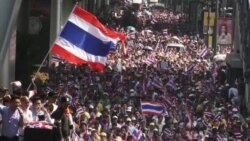BANGKOK —
Thailand's prime minister dissolved the government and called for new elections Monday, but that did little to appease the more than 150,000 people who took to the streets in the capital, demanding she resign.
As demonstrators began converging again on the seat of the Thai government's power, a conciliatory Prime Minister Yingluck Shinawatra announced she would ask the crown to consent to dissolve parliament and hold snap elections.
In a brief, nationally televised address, the prime minister acknowledged widespread opposition to her government, emphasizing authorities do not want to see any further "loss of life."
The prime minister says that after listening to opinions from all sides, she has “decided to request a royal decree to dissolve parliament.”
But Yingluck says her cabinet will remain intact, albeit with limited powers, and she is staying on as caretaker prime minister. Her party says she will stand as a candidate in the new election to be held by February 2.
That did little to appease protesters whose leaders demanded she immediately step down.
Demonstrator Watcharapon Wuou was among those marching to the government center after Yingluck's announcement.
He says the protestors are not satisfied with the dissolution of the parliament and the "prime minister must resign or get out of the country."
The opposition has repeatedly rejected the idea of new elections, instead saying they want to change the country's political system.
Its most vocal leader, a former deputy prime minister, has demanded the elected government be replaced by an appointed but vaguely defined "people's council."
The roots of Thailand's political instability go back years to when Yingluck's brother, the billionaire tycoon Thaksin Shinawatra was prime minister. Although he lives in exile to avoid prison for corruption charges, the parties he has backed have won every national election since 2001, largely from the support of rural and working-class voters.
Observers have deemed the elections free and fair, but his opponents, mainly the capital's middle class and royalist elite, contend Thaksin and his family buy their way to power and enrich themselves while in office.
Protester Santhanee Methaneethom says that is why new elections will not work.
“It is the time that the Thai country should be clean from corruption. So that’s why the people are all here,” said Santhanee Methaneethom.
The latest round of demonstrations began over an amnesty bill introduced by the ruling party that would have cleared the way for Thaksin to return home. The bill was defeated, but sparked mostly peaceful protests that have lasted weeks.
Domestic media reports say leaders of Thailand's powerful military are growing increasingly displeased. The generals have intervened 18 times since 1932, when absolute monarchy rule ended. And despite the assurances of military leaders that this latest crisis will not lead to another coup, few Thais rule that out as a possibility.
As demonstrators began converging again on the seat of the Thai government's power, a conciliatory Prime Minister Yingluck Shinawatra announced she would ask the crown to consent to dissolve parliament and hold snap elections.
In a brief, nationally televised address, the prime minister acknowledged widespread opposition to her government, emphasizing authorities do not want to see any further "loss of life."
The prime minister says that after listening to opinions from all sides, she has “decided to request a royal decree to dissolve parliament.”
But Yingluck says her cabinet will remain intact, albeit with limited powers, and she is staying on as caretaker prime minister. Her party says she will stand as a candidate in the new election to be held by February 2.
That did little to appease protesters whose leaders demanded she immediately step down.
Demonstrator Watcharapon Wuou was among those marching to the government center after Yingluck's announcement.
He says the protestors are not satisfied with the dissolution of the parliament and the "prime minister must resign or get out of the country."
The opposition has repeatedly rejected the idea of new elections, instead saying they want to change the country's political system.
Its most vocal leader, a former deputy prime minister, has demanded the elected government be replaced by an appointed but vaguely defined "people's council."
The roots of Thailand's political instability go back years to when Yingluck's brother, the billionaire tycoon Thaksin Shinawatra was prime minister. Although he lives in exile to avoid prison for corruption charges, the parties he has backed have won every national election since 2001, largely from the support of rural and working-class voters.
Observers have deemed the elections free and fair, but his opponents, mainly the capital's middle class and royalist elite, contend Thaksin and his family buy their way to power and enrich themselves while in office.
Protester Santhanee Methaneethom says that is why new elections will not work.
“It is the time that the Thai country should be clean from corruption. So that’s why the people are all here,” said Santhanee Methaneethom.
The latest round of demonstrations began over an amnesty bill introduced by the ruling party that would have cleared the way for Thaksin to return home. The bill was defeated, but sparked mostly peaceful protests that have lasted weeks.
Domestic media reports say leaders of Thailand's powerful military are growing increasingly displeased. The generals have intervened 18 times since 1932, when absolute monarchy rule ended. And despite the assurances of military leaders that this latest crisis will not lead to another coup, few Thais rule that out as a possibility.







